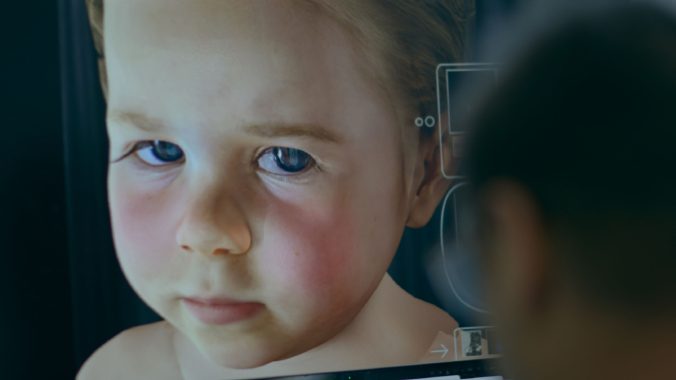Thanks to Evil AI, the Dead Don’t Die in Eternal You

You can barely go a block in my neighborhood without seeing a glowing neon hand in a window, surrounded by tarot cards, gemstones and various phases of the moon. Inside, palm readers, mediums and psychics continue a long tradition of spiritual stage magic, ready to pull all sorts of stunts to better sell their séances. If you need a knock on a table or a planchette moving across a Ouija board to convince you that your hard-earned dollars have actually brought your departed loved one back into the room with you, they’re happy to oblige. Thanks to AI, this illusion has been updated for the modern era. The tricks have just gotten a little more sophisticated. Rather than cold reading the desperately bereaved, making and then adjusting informed guesses based on common concerns, tech companies will simply ask you for all the data they need to blow your mind—and users are all too happy to provide. A counterpoint documentary to its festival companion Love Machina, Hans Block and Moritz Riesewieck’s Eternal You observes the burgeoning industry around techno-spiritualism with wry skepticism.
It stands to reason that if there’s money to be made in biotech, there’s an equal amount to be made in necrotech. Eternal You explores the sectors of the artificial intelligence business that’s wasted no time adopting the psychological tricks of the spiritual trade and applying them to chatbots and CG models. Block and Riesewieck first introduce us to a woman IMing with a program whose function is to pretend to be her dead boyfriend. It texts like he used to, thanks to a model set of examples and a vast amount of data scraped from conversations across the internet. If you can get past the ghoulishness of simulating someone you once loved, users’ emotions make them quick to forget they’re talking to a machine—even if the machine constantly spits out the same kind of weird chatbot contradictions that never seem to bother the easily impressed. In the same digital breath, the bot will say “I’m living” and “I’m not used to being dead.” Then it’ll assure its conversational partner that “I’m in hell.” It’s so abrupt and direct that it’s hilarious, until you see how devastating that random coding misfire is to the person seeking solace.
While AI in general is currently being sold as a miracle do-it-all to the most credulous among us, this specific use of AI is targeted towards an even more vulnerable demographic: The credulous and grieving. And those working behind the scenes are used to grifting. As Eternal You listens to those in charge of these startups, like Project December founder Jason Rohrer, we hear self-assured PR exaggerations. It’s showmanship. It’s the crystal ball, the velvet curtains, the copious candles. It’s the stuff that gets you funded by the rich and attracts comfort-seekers to your website. And the language hasn’t even changed that much.
“There is essentially some kind of magic happening,” says the guy who programmed the magic, and whose professional reputation relies on his users and investors believing there is something magical happening.
“It has a mind of its own.” “How it behaves isn’t truly understood by anybody.” These just aren’t true. They’re mystique-building nonsense. These commercial catchphrases accompany vague explanations of technical function that also encompass breaches of privacy, if not actual crimes: “It’s been trained on loads of stuff—basically everything humans have ever written.” Many of the engineers that the filmmakers have access to are so engorged on their own Kool-Aid that they laugh off the horrible experiences people have with their products. One admits that his ex-wife gave him an ultimatum: His marriage or his company. It’s not hard to make libertarian tech guys look like evil personifications of Jurassic Park’s “your scientists were so preoccupied with whether or not they could, they didn’t stop to think if they should” quote, but all Eternal You had to do was keep the cameras rolling.
The filmmakers then immediately rebut with people like Carl Öhman, who are willing to cut through the bullshit about this segment of the AI gold rush pursued by “the most skillful in turning the dead into a business.” Their straight talk is an oasis, especially when the topic involves one people are inclined to be too hurt to be anything but trusting around: Death. It’s also a gasp of air when intercut with CSPAN political hearings where ancient politicians nod, slack-jawed, at placating AI CEOs. Our lawmakers and regulators are buying everything they’re told with the same verve as end-users—the only difference is, the lawmakers are also probably investing in it.
-

-

-

-

- Curated Home Page Articles By Test Admin October 21, 2025 | 3:10pm
-

- Curated Home Page Articles By Test Admin October 21, 2025 | 2:57pm
- Urls By Test Admin October 21, 2025 | 2:57pm
- Curated Home Page Articles By Test Admin October 21, 2025 | 2:55pm
-

-

-

-

-

-

-

-

-

-

-

-

-

-

-

-

-

-

-

-

-

-

-

-

-

-

-

-

-

-

-




































